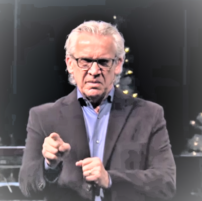 Bethel Church’s senior pastor is “Super Apostle” Bill Johnson, which is a big red flag right there. In a recent blog post, Pastor Gabriel Hughes dealt with an exposé on Bethel Church written by journalist Molly Hensley-Clancy. Hughes thought Hensley-Clancy’s piece was excellent “but the story lacks an important consideration, which even reputable media outlets miss when covering a story like this. That crucial examination is this: theology.” Bethel’s theology is far different than most Bible-believing churches. And because of this there are spiritual concerns we should be aware of, says Hughes. “Is it really all that bad if they are lying about their miracles and glory clouds?” he asks.
Bethel Church’s senior pastor is “Super Apostle” Bill Johnson, which is a big red flag right there. In a recent blog post, Pastor Gabriel Hughes dealt with an exposé on Bethel Church written by journalist Molly Hensley-Clancy. Hughes thought Hensley-Clancy’s piece was excellent “but the story lacks an important consideration, which even reputable media outlets miss when covering a story like this. That crucial examination is this: theology.” Bethel’s theology is far different than most Bible-believing churches. And because of this there are spiritual concerns we should be aware of, says Hughes. “Is it really all that bad if they are lying about their miracles and glory clouds?” he asks.
Yes.
People who attend Bethel learn about a different Jesus than the Jesus of the Bible. And when the gospel is mentioned, it is an altogether different gospel they’re talking about.
Now listen as Pastor Hughes examines Bethel’s theology. He writes:

Last week, a reporter at BuzzFeed posted an in-depth article after going undercover during prophecy week at the Bethel School of Supernatural Ministry. The school is one of the darling ministries of Bethel Church in Redding, CA, which also includes the music of Jesus Culture and their healing ministry Bethel Sozo. Any look into Bethel is bound to uncover some strange things, and the author certainly did. But despite an excellent exposé, she overlooked something crucial.
Molly Hensley-Clancy’s revelation of the charismatic school — nicknamed Christian Hogwarts by its own students — presented more than the usual anecdotes of the weird. She also brought to light what Bethel is doing in their own city. They’ve given money to civic government, invested in the town’s infrastructure, and even paid handsomely to save the jobs of four police officers. Bethel Church members have run for public office and even started a secular public school (they get by with this saying the message of the “kingdom” is love, not religion).
All the kooky trickery that Bethel is known for was in the article, too: glory clouds, fire tunnels, grave sucking, dancing, chanting, healing, creepy laughter, and speaking in tongues. Oh, and false prophecy. Lots and lots of false prophecy. As one former student named Chris pointed out, what they call prophecy is no different than when a psychic does a cold reading. Only one out of every hundred prophecies are “true.” We hear all about those, which they catalog along with their “miracles” like a baptist church does its baptisms. We never hear about the failures.
Hensley-Clancy also pulled back the veil on the dark side of Bethel’s reckless charismaticism, from being a disruption in the community to the point that it has cost people their lives. Perhaps you’ve heard the story about a man who fell down a cliff and some students of Bethel attempted to heal him before they finally got help. There’s another about a young man who died after an asthma attack. Neighborhood Bethelites wasted precious time trying to heal him instead of calling 911.
The coverage was thorough, sure to mention that Bethel is part of the New Apostolic Reformation, (though Hensley-Clancy called it New Apostolic Christianity) before shifting to the new name they wish to go by: the Independent Network Charismatic, or INC. Chris Rosebrough reported earlier that the NAR was attempting to shed the term coined by the late C. Peter Wagner and adopt this new moniker. That’s a change we might have to get used to.
Hensley-Clancy also noted the seven mountains mandate believed on by every NAR church… sorry, INC. She says it is the “belief that Christ will only return to Earth when true believers bring God into seven spheres: religion, family, education, government, media, arts, and business.” Mike Bickle at the International House of Prayer in Kansas City (IHOP), just down the road from where I live, has taught the same thing. It’s one of the reasons I’ve paid so much attention to Bethel in recent years. Even though I’m in Kansas, this does affect my area.
It’s an excellent piece of journalism, something I’d expect to see in a more high-profile publication. As I said, Hensley-Clancy’s writing is excellent, but the story lacks an important consideration, which even reputable media outlets miss when covering a story like this. That crucial examination is this: theology. Why is Bethel different than most Bible-believing churches? Are there any spiritual concerns we should be aware of? Is it really all that bad if they are lying about their miracles and glory clouds? The article only barely touches on such questions, much less gives answers.
The reporting is straight-forward and the writing balanced enough that you could fall to either side of the opinions about Bethel: you might think they’re a nuisance, or you might see them as harmless, even helpful. Sure, there are those students who were so charismatic that their detachment from reality resulted in someone’s death (IHOP has those stories, too, and attempts to cover them up). But at the same time, Bethel is doing a noticeable amount of good for an otherwise drug and crime-riddled community.
Students are coming to BSSM from all over the world, and they’re staying and contributing to the local economy. Hensley-Clancy’s reporting is so fair that she included a comment from a community member who wasn’t thrilled with the international presence Bethel brings to Redding. The resident’s comment came across as bigoted. Who wouldn’t want to see the kind of unity promoted by Bethel Church? Furthermore, their students are often educated, employed, entrepreneurial, and eager to do more.
This is where theology becomes really important. It really doesn’t matter how much good Bethel does in their town. It doesn’t matter that Bethel produces quality and inspiring music being sung all over the world, even in otherwise doctrinally sound churches. It doesn’t even matter where you fall in the cessationism-vs-continuationism debate, whether you believe miracles are still common or not. What Bethel Church is doing is deeply and deceptively demonic. Bear with me as I explain.
Bill Johnson, pastor of Bethel Church, preaches a different gospel. This is a very serious charge, and I’m very serious when I make it. Galatians 1:8-9 says, “But even if we or an angel from heaven should preach to you a gospel contrary to the one we preached to you, let him be accursed. As we have said before, so now I say again: If anyone is preaching to you a gospel contrary to the one you received, let him be accursed.”
Citing this very same passage, Johnson teaches that the gospel is miraculous physical healing, and if anyone says that God doesn’t miraculously heal, or that He would even bring harm rather than healing, they’re teaching a different gospel. But the gospel of Jesus Christ isn’t physical healing, it’s spiritual healing. More than that, it’s spiritual regeneration. The Bible says, “You were dead in the trespasses and sins in which you once walked,” but God who is rich in mercy “made us alive together with Christ — by grace you have been saved” (Ephesians 2:1-10).
As I pointed out in another recent article, the Bible does not say or even elude to the idea that the good news of Jesus Christ will miraculously heal you from any of your physical diseases. Bill Johnson would say I’m teaching a different gospel. But it is he who is preaching a message that can neither save the human soul, nor can it deliver what Johnson says it will. Johnson cannot heal you. Look at the man. If the gospel means miraculous physical healing, why is he wearing glasses? Continue reading